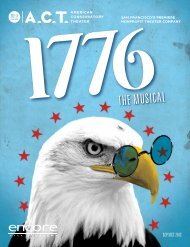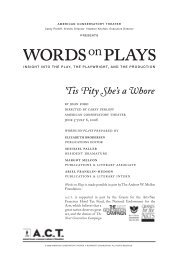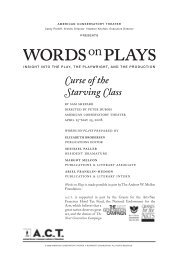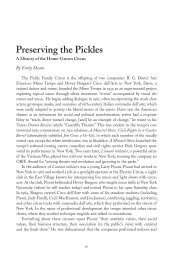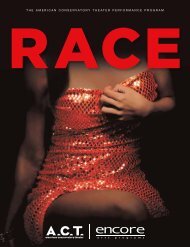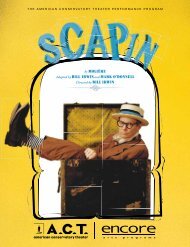WHO'S WHO - American Conservatory Theater
WHO'S WHO - American Conservatory Theater
WHO'S WHO - American Conservatory Theater
You also want an ePaper? Increase the reach of your titles
YUMPU automatically turns print PDFs into web optimized ePapers that Google loves.
IN THE MIDDLE OF AN<br />
OZONE-BLUE SHIVER<br />
The Strange, Surreal Journey of Nikolai Gogol by michael paller<br />
On October 7, 1835, Nikolai Gogol wrote his friend<br />
Alexander Pushkin, “Do me a favor, give me some sort<br />
of subject, funny<br />
or unfunny, as long as it is a<br />
typically Russian anecdote.<br />
In the meantime, my hand is<br />
trembling from the desire to<br />
write a comedy.”<br />
Pushkin responded by<br />
sending Gogol the story<br />
of how a friend of his (or<br />
it may have been Pushkin<br />
himself ) had been mistaken<br />
for a government official<br />
while passing through a<br />
town in Bessarabia. Pushkin<br />
may have been considering<br />
making something of this<br />
anecdote himself; after his<br />
death, an outline was found<br />
among his papers that reads,<br />
in part, “Crispin goes to a<br />
fair in a provincial town and<br />
gets mistaken for . . . The<br />
governor is an honest idiot,<br />
some hanky-panky between<br />
him and the governor’s wife.<br />
Crispin asks for the daughter’s<br />
hand in marriage.”<br />
It’s possible that what<br />
Pushkin sent Gogol was a copy of this fragment, since it bears<br />
considerable resemblance to the comedy that Gogol made out<br />
of it, The Government Inspector. We’ll probably never know for<br />
certain, and, in any case, as the scholar Simon Karlinsky points<br />
out, mistaken-identity scenarios were commonplace in literature<br />
by this time. Indeed, as a schoolboy, Gogol appeared in a play<br />
called A Lesson to Daughters, about a peasant who masquerades<br />
as a French marquis.<br />
In any case, Pushkin’s idea excited Gogol; he wrote the play in<br />
seven weeks near the end of 1835. At this point the play’s troubled<br />
history (troubled for Gogol, anyway) begins: the government censor<br />
refused to approve it. Censorship was ubiquitous during the reign<br />
PETERHOF PALACE, PETRODVORETS, ST. PETERSBURG, RUSSIA/THE BRIDGEMAN ART LIBRARY<br />
CZAR NICHOLAS I AND GRAND DUKE ALEXANDER IN ST. PETERSBURG, 1843, BY KARL KARLOVICH PIRATSKY<br />
of Czar Nicholas I, who was determined to quash any attempts<br />
to assassinate or overthrow him (his ascension to the throne in<br />
November 1825 was greeted<br />
by just such an attempt, the<br />
Decembrist Revolution, the<br />
following month). Every book,<br />
play, pamphlet, newspaper,<br />
and journal article published<br />
in Russia had to be approved<br />
by the censors, whose presence<br />
extended into every nook<br />
and cranny of Russia’s vast<br />
bureaucracy, including the<br />
committee for the building of<br />
the Cathedral of St. Isaac, the<br />
committee on archaeology,<br />
and the department of horse<br />
breeding. The scope of the<br />
censors was so vast that,<br />
according to one of them, “if<br />
one were to count all offi cials<br />
in charge of censorship their<br />
numbers would greatly exceed<br />
the number of books published<br />
annually.” The post office<br />
was an important participant<br />
in official censorship, and<br />
Shpyokin, the postmaster in<br />
The Government Inspector,<br />
would be well practiced in<br />
his habit of reading other people’s mail, not only for his own<br />
amusement, but possibly also on behalf of the government. As the<br />
Magistrate in The Government Inspector says, “The authorities are<br />
clever. We may be far away, but they have their eye on us. One hint<br />
of treason here, and in Petersburg, their moustaches twitch.”<br />
Gogol appealed for help to another friend, the respected<br />
author and teacher of Pushkin, Vasily Zhukovsky. Zhukovsky had<br />
heard Gogol read the play, liked it enormously, and enlisted the<br />
aid of some nobles who appealed directly to the chief censor, the<br />
czar himself. When the czar announced that he found the play<br />
uproariously funny, the censor experienced a sudden change of<br />
heart and approved the play for production.<br />
The Government Inspector 11




